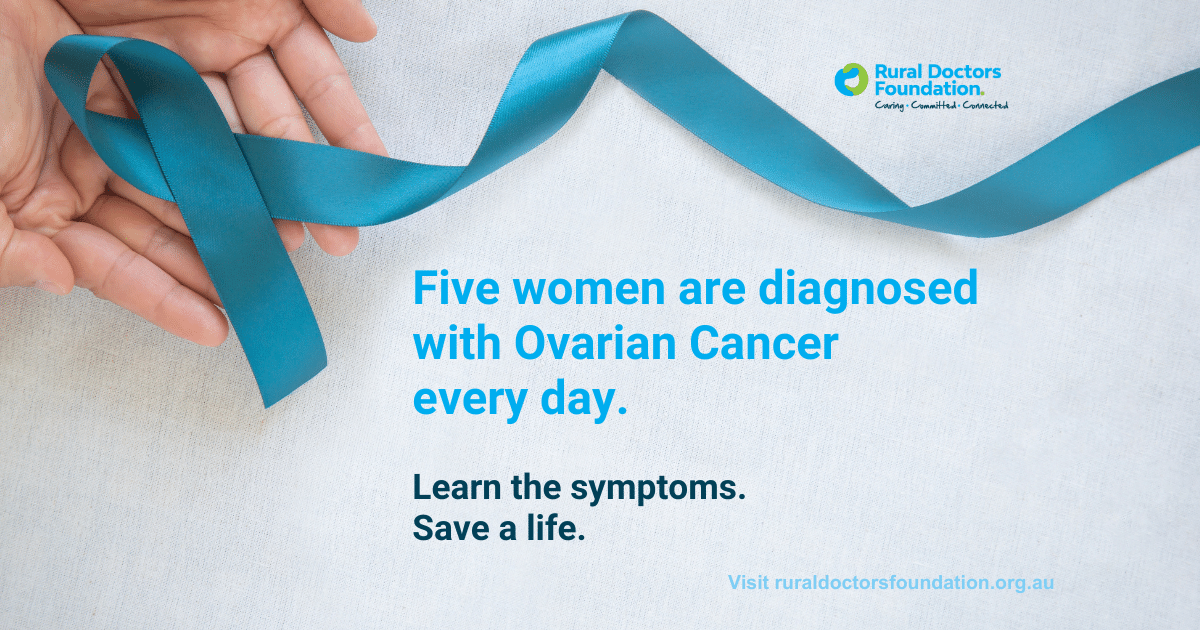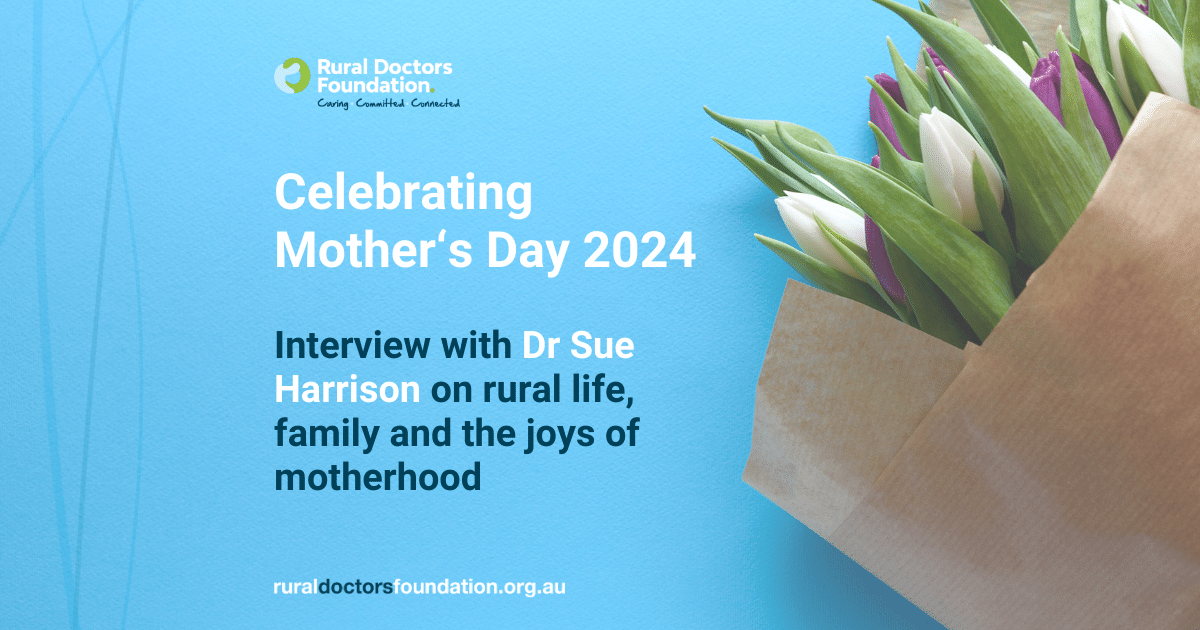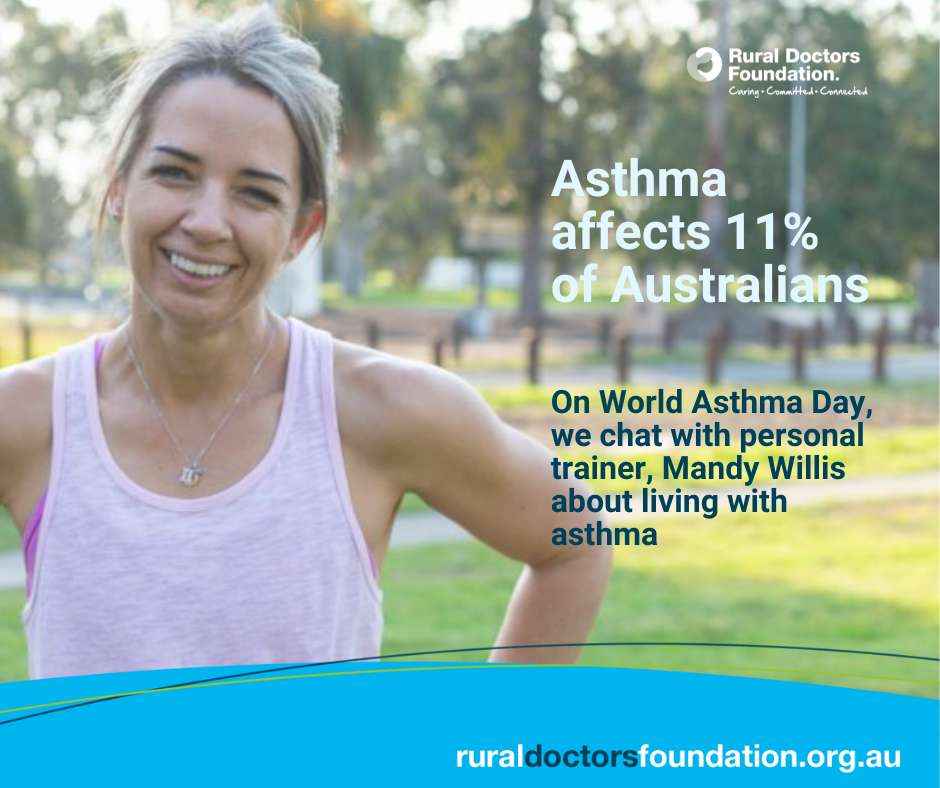Five women are diagnosed with ovarian cancer every day in Australia.
It’s a prevalent health issue and one that needs to be discussed more. By highlighting the signs and symptoms to watch out for, Rural Doctors Foundation hopes to empower women to monitor their health and seek out early detection.
Early detection improves ovarian cancer survival rates
Ovarian cancer occurs when abnormal cells grow in an uncontrolled way in one or both of a woman’s ovaries.
Early detection of ovarian cancer provides better outcomes for treatment and survival.
Sadly, women living in remote and rural areas of Australia have a higher risk of dying from ovarian cancer than in major cities. More research must be done to determine the exact reasons why this is happening in rural and remote areas, but possible explanations are diagnostic delay and poorer access to treatments.
While access to medical services is an issue in rural Australia, women need to be vigilant about seeing a doctor if they are experiencing symptoms.
Research has shown that 66 per cent of women had not heard of ovarian cancer, or knew anything about it, prior to their diagnosis, making awareness of ovarian cancer an important step in improving survival rates of women with the disease.
Awareness of ovarian cancer symptoms
Awareness of possible symptoms becomes critical in the process of increasing the survival rate through early detection.
Nine out of ten women diagnosed with ovarian cancer experienced symptoms which shows the importance of women becoming aware of the symptoms and seeing their doctor promptly when any of these symptoms are experienced.
There are no obvious signs of ovarian cancer, however a woman with ovarian cancer may have one or more of the following symptoms:
• Frequent or urgent urination
• Indigestion
• Difficulty eating or feeling full quickly
• Abdominal bloating
• Back, abdominal or pelvic pain
• Constipation or diarrhoea
• Menstrual irregularities
• Tiredness
• Unexplained weight loss or weight gain
• Pain during intercourse
These symptoms can be caused by other conditions but if you are experiencing any of these symptoms, please see your doctor promptly.
Your doctor may suggest several tests to look for tumours, cysts or other changes. These tests may involve physical examinations, blood tests, pelvic ultrasounds, CT Scans and PET Scans.
Treatment of ovarian cancer depends on the extent of the cancer and staging of the cancer, often diagnosed through tests and surgery.
Ovarian cancer quite often is found when it has spread beyond the ovaries, to other pelvic structures or of lining of the abdomen.
Treatment can be surgery, chemotherapy, radiation therapy, other drug therapies or palliative care.
Finding out you have cancer can be an extremely emotionally challenging time. Getting the emotional support you need from your loved ones is so important, particularly when it comes to your mental health.
While a strong support network of family and friends is a great starting point, seeking out professional help is also often beneficial. You can talk to your doctor to find out your options for support such as being referred to a psychologist.
After cancer treatment, getting back into living a healthy lifestyle that includes physical activity, eating healthy and looking after your emotional wellbeing is the most important thing you can do for yourself. It is important to make healthy changes according to your level of health and strength, and your doctor can help you along the way.
Reducing your risk of ovarian cancer
There are risk factors which may increase the likelihood of ovarian cancer. Some risk factors are non-modifiable such as:
• Age: your risk increases as you get older
• Family history: your risk increases if your family has had ovarian, breast, endometrial or colorectal cancer
• Ethnicity: those with a Jewish Eastern European background have a higher risk
• Genetic mutations: 20-25 per cent of those diagnosed with ovarian cancer have a heredity tendency to develop ovarian cancer
Other factors that increase your risk are if a woman has not delivered a baby and if she has taken hormone-replacement therapy.
Sadly, there is no proven method of preventing ovarian cancer.
However, there are some measures that may help lower your overall risk, which can be considered in certain circumstances and discussed with a doctor.
Some of these ways are through decreasing the number of menstrual cycles through pregnancy or lactation, taking the contraceptive pill and the removal of your ovaries and fallopian tubes.
It is just as important to consider the risks, consequences and potential side effects of these with your doctor, which will be individual to each woman.
Women with ovarian, breast, endometrial or colorectal cancer can speak to their doctor about access to genetic counselling too.
How a healthy lifestyle can lower the risk of cancer
New research shows that lifestyle factors can lower the risk of cancer, including ovarian cancer.
A study published in 2023 analysed 94,778 adults with the average age of 56, to find any relationship between adhering to the 2018 World Cancer Research Fund/American Institute for Cancer Research recommendations and cancer risk.
It was found that adherence with the recommendations was associated with lowering the risk of cancer. Adherence to the recommendations were measured on a seven-point scale. With every one-point increase of adherence, it lowered the risk of ovarian cancer by 24 per cent.
The cancer prevention recommendations aim to reduce the risk of cancer by encouraging individuals to maintain a healthy weight, be physically active, and eat a diet rich in wholegrains, vegetables, fruit, and beans, but low in highly processed foods, red and processed meat, sugar-sweetened drinks, and alcohol.
While there needs to be more research into individual lifestyle factors and individual cancers as this is an emerging field, following these recommendations will not only help lower your risk of cancer, but also offers overall health and wellbeing benefits.
Jade Newnham is an accredited health and wellness coach (with HCANZA) specialising in mental fitness. Jade is also a registered mindfulness, meditation and breath work teacher (with Meditation Association of Australia). Her work and educational background includes Public Health at state level and she is currently undergoing accreditation in Lifestyle Medicine.





